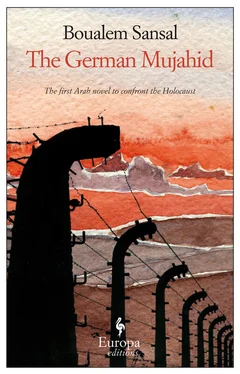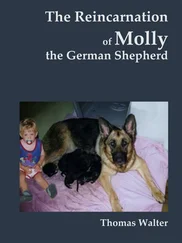I’m not expecting you to do anything, I just think that there are some things that have to be done, so I’m writing to you. I expect you’ll reply quickly and comprehensively, that’s one of the things the French civil service is proud of. You’ll tell me how impressed you are by my civic mindedness, and you’ll give me a whole spiel about the steps being taken by you and by the government to restore law and order on the estate. If that’s what you’re planning to say, and I’m pretty sure it is, then don’t bother, I’ve heard it all before.
Yours,
A furious citizen notionally under your jurisdiction but forced to live under Islamic law.
RACHEL’S DIARY, FEBRUARY 1996
AUSCHWITZ, THE END OF THE JOURNEY
This was how I planned it, I wanted to end my journey in Auschwitz. I arrived in the early morning, I wanted to be on my own before the busloads of tourists showed up. It was going to be a long day. The camp is vast, over 45 square kilometres, more than 11,000 acres. It is a city, like the gold-rush towns that sprang up in far-off countries in an era of rampant capitalism, booming cities sprawling out from a small encampment, motivated by greed and haste, funded by new finds, new wealth; a city both orderly and chaotic, with well-defined boundaries, broad avenues, parade grounds vast enough to intimidate a marathon runner, ugly administrative buildings, posh neighbourhoods with ridiculous houses, baroque castles, opulent cathedrals, cookie-cutter working-class slums stretching out forever, rococo theatre, extravagant cinema, trendy nightclubs, bustling brothels and dreary bars, industrial estates, train stations and shunting yards, warehouses, anaemic parks, astonishing wastelands, the hectic markets, and the sports grounds that show the city is dying of boredom and inaction, the frightening barracks and the rudimentary runway flanked by a control tower that will soon be an aerodrome worthy of a capital. This is how they are, these vast, mushrooming cities, electrifying and monotonous, full of potential and doomed, they create wealth and poverty in equal measure and in the end, they make poverty and violence a daily occurrence, they are madness in search of apotheosis. Here, life is sparkling, free, clever, a constant spectacle, while in the underbelly, in the measureless favelas that ring the city, people’s lives are cramped, teeming, shameful, nameless and they die with disturbing ease, die at a yes or a no . These unplanned cities, carved into the logic of the totalitarian system that created them, flourish based on a myth, and based on that same myth they die. One day, nature reasserts itself and everything silently disappears, swept away by the absurdity that created it. It was not gold that spawned this oppressive city, born out of the ashes of a poor remote village in the heart of Poland, it was not oil, or coffee, or rubber or rare metals, but the systematic extermination of the Lebensunwertes Leben , Jews preferably, and gypsies, but also political prisoners, antisocial elements, and all possible types of Minderwertige Leute. To tell the truth, this city was a powerhouse prepared to burn anything it could lay its hands on — there was no question of shutting down the furnace just because the supply of Jews dried up. In hell, everything burns, tramps and traitors, enemies and resistance fighters. Auschwitz was the largest, the most dismal, the most deadly and the most rapacious of the Nazi death camps. In four short years, 1,300,000 men women and children, ninety percent of them Jews, were tossed into the furnaces — an average of a thousand souls a day, the equivalent of a village wiped off the map, house by house, family by family, between daybreak and sunset.
It was still dark and terribly cold, a grubby snow was falling and the wind from the east cut through me. If I had been hoping for the worst welcome to punish me for returning to the scene of my father’s crimes, I got my wish, but it was still far from enough. For a prisoner arriving here on the death train, there were many things that made their arrival infinitely more cruel, the exhaustion of having had to stand for days in crowded cattle trucks: the hunger, the thirst, the filth, the panic, the fear, the torture of the selection process, the pomp and ceremony, the contemptuous orders, the barking dogs, the brutality of the soldiers, the humiliation of having to undress outdoors, the shaving of their hair, the tattooing of a number on the forearm, and, through everything, the overpowering sense that something incalculable and terrible has happened here: it was here that humanity ended, betrayed by God himself. Were they still men when they arrived in the camp? Arriving here on a tourist train on a bright spring day would have been obscene. I am not just any visitor, I am Helmut Schiller, son of SS Officer Hans Schiller, and in this place lie my father’s share of 1,300,000 dead, gassed for the most part, shot in the head if they were lucky. I had only one choice, to arrive as my father had, in a warm car, calm, perhaps preoccupied by some technical problem, or arrive like a prisoner, terrified, starving, numb, soaked to the skin, more alone than anyone in the world, traumatised by what was going on, not knowing what was expected of him, of him in particular. I wanted to approximate the reality of a prisoner arriving here, wanted to know how far my father had come. But I know that this atrocity beggars belief, that nothing and no one could bring me even a fraction of an inch closer to understanding it. I am free, I came here of my own free will, I stand here a free man, I have my hair, my teeth, I have my papers in my pocket, and, barring some accident, murder, a fatal illness or suicide in a moment of madness, I know that I will be alive tomorrow, and the day after, and the day after that and so on to the end of my days. I cannot make myself a camp prisoner, a guinea pig in a Nazi laboratory, a Sonderkommando or a Kapo , all I can do is slip into my father’s thoughts, retrace his footsteps, try to follow his terrible path; I can do nothing but try to empathise with a prisoner, try to feel as he must have felt as death, mysterious and degrading, sweeps over him. I can do nothing. But I am here, I had to come, and I must go on to the end.
I followed the tracks for the death train from the Jewish platform, the Judenrampe. In the distance, barring the horizon, is the building that appears in every book, a long, low, red-brick building with a red-tiled roof and a watchtower in the middle, straddling the tracks. This is Auschwitz II, Konzentrationslager Auschwitz II-Birkenau. Past the entrance arch, barracks stretch out endlessly in serried ranks. On one side is the women’s camp, on the other, the men’s, and everywhere you look, watchtowers, barbed wire, electric fences. There can be no mistake that hell was once built here, not long ago: everything is still as it was, everything is ashes and solitude just as it once was. Here, in Birkenau, evil reached its apogee. To the east is Auschwitz-I, the wrought iron gate crowned with the famous motto: Arbeit macht frei. Work shall set you free. Inside, in what was once a high-security area, is the Krupp armaments factory, the DAW, the Deutschen Ausrüstungswerke factories, the SS Werkstätten— workstations, the general pharmacy and a number of hospital blocks known as the HKB, the Häftlings-Krankenbau for soldiers and Arbeiter . Three kilometres to the north is Auschwitz-III Monowitz. The great, grey complex of buildings you can glimpse through the mist was occupied by IG Farbenindustrie , which specialised in making Zyklon B, fertilisers and detergents. You have to imagine all these things: the buildings are no longer there, they were bombed in 1944 and later razed. You can still see the foundations. In the Buna-Werke , another complex which was bombed, synthetic rubber, essential to the Third Reich, was made. Ten thousand prisoners worked in gruelling shifts. I don’t believe a single one emerged alive, they knew too much, the secrets of production, they had had contact with military secrets far ahead of their time. The last Arbeiter were massacred during the chaos after the Soviet army marched into Poland and its units advanced on the camps at breakneck speed, trying to get there before everything was destroyed or removed.
Читать дальше












